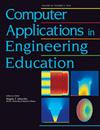Measuring the Impact of Web-Based Educational Tools on Enhancing Student Learning Indicators in Programming Skills, Computational Thinking, and Problem-Solving
Abstract
E-learning technologies now dominate education transformation, including programming education, which requires practical activities and immediate feedback. However, several students find difficulties in learning through traditional instructional methods because these methods fail to create full student engagement and advanced, concept-specific assistance. This study explores how web-based educational tools, particularly e-learning platforms, serve to develop computational thinking and problem-solving abilities of IT diploma students at Al-Baha University. Students participated in an experimental research design in which they were divided into two groups. One group used e-learning tools while the other followed traditional classroom teaching. Student performance data were measured by pre-tests and post-tests combined with surveys that assessed students' problem-solving abilities. Computational thinking abilities along with problem-solving skills and academic performance levels improved more in the experimental group than in the control group because their pass rates increased notably. The experimental group students delivered superior results for Learning Gain and Approving Gain because their programming concepts comprehension increased in addition to improved academic achievements. Students in the experimental group felt more satisfied with better involvement due to their contact with interactive e-learning methods. Interactive web-based education enables students to improve their academics along with their motivation because these educational methods deliver flexible effective learning experiences. Through its findings the study advances e-learning benefits knowledge in higher education and provides concrete suggestions to integrate interactive technology into IT programming education.

 求助内容:
求助内容: 应助结果提醒方式:
应助结果提醒方式:


